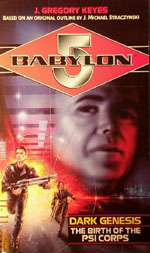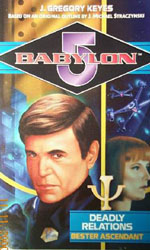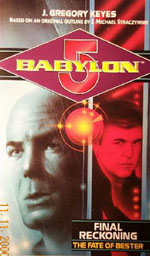 There was a time when I owned every single Star Trek tie-in novel ever published. When I became a paperboy in grade school I took my first real paycheck and bought every single Star Trek novel ever published by Pocket Books. (This would have been the late ‘80s, so there would have already been a lot of them, although not nearly as many as there are now.) I had already collected all the novels published before Pocket Books took the helm, including the retellings of the original series by Blish and the animated series by Alan Dean Foster. I took a great deal of pride in the completeness of my collection, continuing to buy each and every Star Trek novel as it was released.
There was a time when I owned every single Star Trek tie-in novel ever published. When I became a paperboy in grade school I took my first real paycheck and bought every single Star Trek novel ever published by Pocket Books. (This would have been the late ‘80s, so there would have already been a lot of them, although not nearly as many as there are now.) I had already collected all the novels published before Pocket Books took the helm, including the retellings of the original series by Blish and the animated series by Alan Dean Foster. I took a great deal of pride in the completeness of my collection, continuing to buy each and every Star Trek novel as it was released.
I kept that up even after I had essentially stopped reading them. Then, eventually, the habit grew too expensive: Once DS9 made its appearance there were three different series of novels, each with a monthly release, and I couldn’t afford to spend $20 or more each month on books I wasn’t even reading.
Not to mention the shelf space.
My point here is that I had gotten to the point where I simply ignored media tie-ins. My philosophy was simple: With all the great books out there that I will never get a chance to read, why should I waste my time trying to sort through the great sea of mediocrity which is tie-in fiction?
But then I encountered Babylon 5, which lit a burning passion in my heart. In fact, the TV series was painfully good, with each new episode leaving an ache of yearning in its wake.
That ache still wasn’t good enough to get to me try out the tie-in fiction, mind you. In fact, in a lot of ways, my love for this particular series only made the tie-in novels less interesting to me. Why? Because what raised Babylon 5 to its transcendent level was largely the loving care with which J. Michael Straczynski revealed his universe, his characters, and his story. Disconnected, disjointed tie-in fiction written by third party authors simply lacked the very things which made Babylon 5 so special.
 But, suddenly, that changed: The license for Babylon 5 tie-in novels changed hands and, with the new arrangement, J. Michael Straczynski was providing detailed outlines. The new novels were, rather than being misbegotten step-children, unique new windows into the Babylon 5 universe.
But, suddenly, that changed: The license for Babylon 5 tie-in novels changed hands and, with the new arrangement, J. Michael Straczynski was providing detailed outlines. The new novels were, rather than being misbegotten step-children, unique new windows into the Babylon 5 universe.
And that, finally, enticed me back into the tie-in stable. Three trilogies resulted from the Straczynski outlines: Legions of Fire by Peter David; The Passing of the Techno-Mages by Jeanne Cavelos; and The Psi Corps Trilogy by J. Gregory Keyes. All three were eventually issued as omnibuses by the SFBC, and it’s in that form that I finally picked up copies.
I read Legions of Fire last year. It was my first choice among the three because it finished the story of Londo Mollari – a story which had been broadly and intriguingly hinted at over the course of the TV series, but never told. Its revelations made it an addictive and entertaining read for me, but I couldn’t help regretting the relative crudity of its craft. In a lot of ways, the flaws in the novel made it painfully clear that I was reading a novel written by one author from the outline of another: For whatever reason, Peter David had been unable to fully own the material, resulting in a certain lack of depth. Nor had he been able to forge a smooth narrative from bullet points, creating an awkward pacing and a definite lack of causal continuity.
In short, you had a very compelling plot that simply didn’t come to life in the telling. The result was something that I think any fan of Babylon 5 would enjoy reading, but which fails on its own merits. As a result, I ended up setting aside the other two trilogies, expecting more of the same.
All of this is nothing more than a lengthy prelude, however. What I’m really here to talk about is my reaction to The Psi Corps Trilogy, which I just finished reading.
Let me brutally blunt here, because otherwise I fear my point will be lost:
These are damn good books.
And I don’t mean that in a “these are really good considering that they’re tie-in novels” way. I mean that these are damn good books, period. Start with a little of Mutant by Henry Kuttner, then add a lot of The Demolished Man by Alfred Bester, and then give it some meat with a dark version of the best parts of Ender’s Game by Orson Scott Card and you’ll begin to have some sense of what The Psi Corps Trilogy has to offer.
In short, J. Gregory Keyes offers a dynamic, complex story with an epic scale. He seizes the opportunity to work with a large, multigenerational cast by drawing each character with care and detail. He then cements the entire work by placing at center stage an absolutely compelling psychological drama which takes the reader’s heart in hand and wrings emotion from it almost effortlessly.
The only “flaw” – and I hesitate to call it such – is that there is a gap in the narrative of the trilogy. The first volume, in an epic style reminiscent of the Foundation Trilogy, covers the history of telepaths from their first appearance in the 21st century until the time of Alfred Bester (another of the many compelling and deeply drawn characters from the television series). The second volume is the life story of Bester up to his first appearance in the series. The third volume essentially completes Bester’s story after the series. (The missing part of the narrative, of course, is the story that we see in the series itself.)
 In essence, The Psi Corps Trilogy is the Tragedy of Alfred Bester. The particular brilliance of the work can be ascribed entirely to Keyes’ success in not only telling this story as an intense drama of the human spirit, but also by imbuing in Bester the legacy of the telepathic race. Keyes perfectly captures a character created by Straczynski and portrayed by Walter Koenig, and then renders that character into a Janus-like figure, looking down upon the twin destinies of his people. The result is Shakespearean in its scope.
In essence, The Psi Corps Trilogy is the Tragedy of Alfred Bester. The particular brilliance of the work can be ascribed entirely to Keyes’ success in not only telling this story as an intense drama of the human spirit, but also by imbuing in Bester the legacy of the telepathic race. Keyes perfectly captures a character created by Straczynski and portrayed by Walter Koenig, and then renders that character into a Janus-like figure, looking down upon the twin destinies of his people. The result is Shakespearean in its scope.
As I sit here, giving the work the thought it deserves – looking at its details and savoring each in turn – I am particularly struck by the complexity of the characters. Not only does Keyes practice an exceptional conservation of cast (never once allowing a character to simply amble through his narrative without some deeper purpose or effect), he also makes sure that every character is fully realized as a living, breathing being.
On a similar note, the careful weaving of the story’s many themes also leaps out at me as a stellar accomplishment. No event is allowed to pass as an idle plot point: Nothing simply happens – it happens to someone, and has a meaning; an impact; an effect upon them. And, on top of that, each event carefully illuminates some new facet of the gem which Keyes is crafting – it has a unique significance not only to the characters, but to the reader.
Which brings me back to my thesis statement:
These are damn good books.
You should read them.
GRADES:
DARK GENESIS: A
DEADLY RELATIONS: A
FINAL RECKONING: A
J. Gregory Keyes
Published: 1998-1999
Publisher: Del Rey
Cover Price: $6.50
ISBNs: 0-34-542715-7 / 0-34-542716-5 / 0-34-542717-3
Buy Now!












